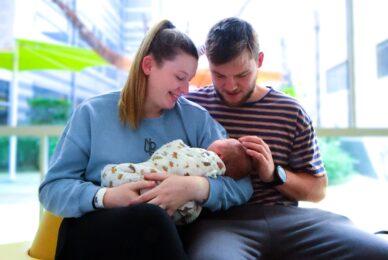



Postnatal Care
Birthing Person
Caring for you
- After the birth of your baby you will spend up to two hours in the birth suite bonding with your baby and having some special time with your partner/support person.
- We encourage skin to skin with you and your baby or your baby and your support person after birth for at least one hour.
- With support from your midwife, we will encourage you to feed your baby either by breast or artificially feed when they are ready.
- Midwives are there to help you throughout the postnatal period and will spend time with you educating, providing support and discussing any concerns/questions you may have.
Homecare Midwife Visits
- Once you and your baby are discharged from the hospital, the home care midwives will visit you at home to perform routine checks and provide additional support to you and your family.
- They will contact you to arrange an appropriate time to visit, usually 1 or 2 days after discharge.
Exercises
- Postnatal pelvic floor exercises are important
- The physiotherapy department run “Mum and Bub” postnatal classes every Wednesday, 10.30am-11.30am, in the Hopwood Centre, Leichardt Street, Echuca. Everyone is welcome.
- Fact Sheets:
- The Royal Women’s Hospital: Exercising post Birth: https://www.thewomens.org.au/health-information/pregnancy-and-birth/your-health-after-birth/exercise-after-birth
- The Royal Women’s: Preventing Constipation: https://thewomens.r.worldssl.net/images/uploads/fact-sheets/Preventing-constipation.pdf
- The Royal Women’s: Abdominal-muscle separation: https://thewomens.r.worldssl.net/images/uploads/fact-sheets/Abdominal-muscle-seperation-270719.pdf
- The Royal Women’s: Improving your Recovery After Birth Flyer: https://thewomens.r.worldssl.net/images/uploads/fact-sheets/Improving-your-recovery-after-birth-240219.pdf
- You can speak with your General Practitioner or Midwife to organise a referral or call the ERH Physiotherapy department for more information on:
- Hours: 8:00am – 4:30pm Monday to Friday
- Location: The Hopwood Centre, Leichardt St
- Phone: 03 5485 5801
- Fax: 03 5485 5833
- Fact Sheets:
Rest Period
- The rest period in maternity is between 1.00pm-3.00pm.
- We encourage you to let your family and friends know that they will not be able to visit you during this time.
- It is important for you to rest as much as possible after your baby is born. When your baby is asleep, we encourage you to take the opportunity to rest.
The Baby Blues
- Some mothers experience ‘baby blues’ around the third or fourth day after birth. It can be normal to feel tearful, emotional, overwhelmed and anxious during this time.
- For most mothers these feelings will generally subside, but for some women these feelings can continue on to be postnatal depression.
- It is important that you let someone know if you are feeling overwhelmed so supports can be provided. Think about talking to:
- Your partner, family or support person.
- Maternal and child health nurse.
- Your local doctor.
- Counselling services are available by contacting the Primary Care Consulting Suites on 5485 5800.
Baby
Rooming in
- During your hospital stay your baby will remain in your room with you. This gives you the opportunity to bond with your baby and respond to their needs.
- Support and assistance with baby care and feeding are available at all times.
Breastfeeding
- At Echuca Regional Health we support breastfeeding, although some people choose not to breastfeed, your decision will be supported.
- Breastfeeding provides multiple benefits for both the baby and mother.
- You will be provided more information about antenatal expressing and breastfeeding at your booking in appointment.
Immunisations
- Whilst you are in hospital, we will commence your baby’s routine immunisation schedule by offering the first Hepatitis vaccination. A consent form will be given to you to fill out prior to administration.
- More information on these vaccinations is provided online:
- Hepatitis B
- Vitamin K
Blood tests
- When your baby is between 36-72 hours old, the midwives will take a routine sample from a “heel prick” blood test called a Newborn Screening Test (NBST) that screens for various disorders.
- Information will be provided to you after the birth as we require written consent to perform the screening test.
Child Health Record
- Once you have had your baby, you will receive a record of your baby’s birth and development.
- It is a good idea to pack this in your nappy bag and take to all your appointments.
Paperwork
Before you leave the hospital, you will be given a parent pack. The enclosed paperwork is about Centrelink payments and registering your baby’s birth.
You have 60 days to complete and send to the appropriate agencies.
Maternal & Child Health
Once you are settled at home and our midwives are happy to discharge you from our care, you and your baby will continue to be supported by your local Maternal & Child Health Care service (MCHN) or family health nurse. This service is a free primary health service that promotes the health wellbeing and development of your children and their families.
They will be in contact with you for appointment dates and times.


